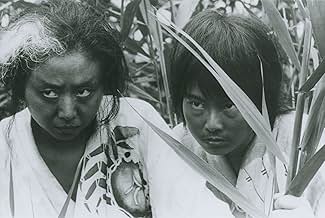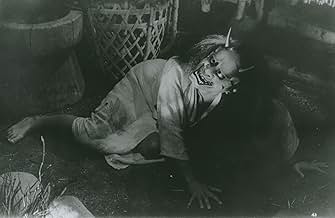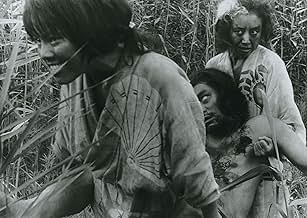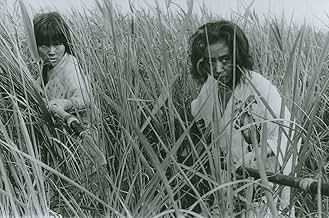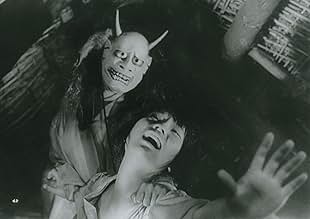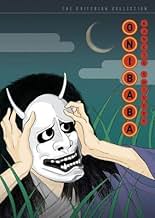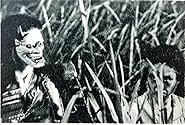CALIFICACIÓN DE IMDb
7.9/10
24 k
TU CALIFICACIÓN
Dos mujeres matan samuráis y venden sus pertenencias para ganarse la vida. Mientras una tiene una aventura con su vecino, la otra mujer conoce a un misterioso samurái que lleva una máscara e... Leer todoDos mujeres matan samuráis y venden sus pertenencias para ganarse la vida. Mientras una tiene una aventura con su vecino, la otra mujer conoce a un misterioso samurái que lleva una máscara extraña.Dos mujeres matan samuráis y venden sus pertenencias para ganarse la vida. Mientras una tiene una aventura con su vecino, la otra mujer conoce a un misterioso samurái que lleva una máscara extraña.
- Dirección
- Guionista
- Elenco
- Premios
- 2 premios ganados en total
- Dirección
- Guionista
- Todo el elenco y el equipo
- Producción, taquilla y más en IMDbPro
Opiniones destacadas
To describe this film in one word, that word would have to 'wow', or something to that effect. In short, Onibaba is an absolutely spectacular cinematic spectacle, and one that has few equals in it's field. In fact, it's the perfect fusion between art-house cinema and atmospheric horror! Loosely based on a Buddhist fable, Onibaba tells a story of lust, envy, wrath and betrayal which is wrapped up by way of a hideous demon mask. Onibaba is a human drama before it's a horror movie - all the character actions are driven by their various needs and wants, and the all the comeuppance emancipates from there. The characters and their actions are constantly fascinating, and it's that which predominantly keeps the film alive. We follow a mother and her daughter-in-law; a couple that are forced to eke out an existence in war torn Japan by killing passing samurai's and selling their belongings for food. Their existence is upset one day, however, when the son's friend, Hachi, returns from the war to the place where the two women live.
The title of the film roughly translates into English as 'demon woman', and that is an apt title for this story. Although the film doesn't contain any actual demons or other mythical creatures, the real horror comes from the character actions and the film succeeds as a horror film in that way. The atmospheric location, which consists of a huge area covered in reeds, adds weight to film's claim to the horror genre also and the location provides a truly stunning set for this story to take place. The film also features a dark pit, which the women use to dump the bodies of the Samurai they kill, which adds to the fantasy and inventive element of the story. The film is cinematic poetry on many levels, from the bleak yet beautiful cinematography, to the elements of the location mentioned - all the way down to it's central piece of imagery - the mask itself. The mask is the film's centrepiece, and the part's where it features are the most memorable of the movie.
Prolific Japanese director Kaneto Shindô takes us on a tour-de-force of atmospheric direction. He spends a fair amount of time focusing on the reeds blowing in the wind and many of his angles focus on the sky, which will no doubt irritate the less adept viewers amongst us - but the rest of us know that this is a way for Shindô to aptly portray his setting, and every instance when he did that was a delight for yours truly. There are many great shots in this movie, and if you're a fan of technical prowess, Onibaba is your film; and even if you're not, this film is a must see.
The title of the film roughly translates into English as 'demon woman', and that is an apt title for this story. Although the film doesn't contain any actual demons or other mythical creatures, the real horror comes from the character actions and the film succeeds as a horror film in that way. The atmospheric location, which consists of a huge area covered in reeds, adds weight to film's claim to the horror genre also and the location provides a truly stunning set for this story to take place. The film also features a dark pit, which the women use to dump the bodies of the Samurai they kill, which adds to the fantasy and inventive element of the story. The film is cinematic poetry on many levels, from the bleak yet beautiful cinematography, to the elements of the location mentioned - all the way down to it's central piece of imagery - the mask itself. The mask is the film's centrepiece, and the part's where it features are the most memorable of the movie.
Prolific Japanese director Kaneto Shindô takes us on a tour-de-force of atmospheric direction. He spends a fair amount of time focusing on the reeds blowing in the wind and many of his angles focus on the sky, which will no doubt irritate the less adept viewers amongst us - but the rest of us know that this is a way for Shindô to aptly portray his setting, and every instance when he did that was a delight for yours truly. There are many great shots in this movie, and if you're a fan of technical prowess, Onibaba is your film; and even if you're not, this film is a must see.
Wow,I saw this movie on Cable recently.Both of the women in this story are just trying their best to get by and survive in a bad situation.I could tell it was on a limited budget but very well written.It was erotic with frontal nudity and even filmed in the 60's.It had me on the edge of my seat the whole time.I was trying to figure out where they were going with the whole thing.I kept trying to decide if I sympathized with the old woman more than the young one.Then at the end I felt sorry for both of them.What a great story.This one needs to be on Cable more often.This one is a must see even for people who only like contemporary films.I would recommend it to anyone.
Life's been tough, and you're surviving on the edge, trapping Samurai from flows in which you dredge, your often empty skillet, is sometimes, filled with millet, but at least your daughter in law helps you fetch. A neighbour returns home, with some bad news, your son, fallen in battle, no longer moves, it's not long before his wife, is causing stress, struggle and strife, behaving in a way you wholly disapprove. By fortune, you obtain a Hannya Mask, it comes in handy for a demonising task, a barrier of sorts, daughter in law's trips cut short, but there's no time to enjoy pleasures, or to bask.
Nobuko Otowa provides us with a truly outstanding performance as she grapples with her daughter in law's infidelity after the loss of her husband, leaving her isolated, alone and forgotten. The cinematography is sublime, the raw emotions unrefined, and the mask a cursed damnation that sticks and binds.
Nobuko Otowa provides us with a truly outstanding performance as she grapples with her daughter in law's infidelity after the loss of her husband, leaving her isolated, alone and forgotten. The cinematography is sublime, the raw emotions unrefined, and the mask a cursed damnation that sticks and binds.
While not the greatest Japanese movie ever made, this proves that you don't need Akira Kurasawa to direct an excellent Japanese film.
"Onibaba" is Japanese for "grandma-monster" and this refers to a story the older woman tells the younger in order to get her to stay home and stop carrying on her affair with a ne'er-do-well. Unfortunately, when the older lady dresses up AS the monster in order to scare her, things change for the worse unexpectedly.
Despite this brief description, this isn't really a horror movie, but a tale about three basically greedy people. So what did I like about it? Well, the story has such interesting twists and turns that keep the viewer guessing and it is a good study of human nature in its worst form. Overall, very odd but captivating.
"Onibaba" is Japanese for "grandma-monster" and this refers to a story the older woman tells the younger in order to get her to stay home and stop carrying on her affair with a ne'er-do-well. Unfortunately, when the older lady dresses up AS the monster in order to scare her, things change for the worse unexpectedly.
Despite this brief description, this isn't really a horror movie, but a tale about three basically greedy people. So what did I like about it? Well, the story has such interesting twists and turns that keep the viewer guessing and it is a good study of human nature in its worst form. Overall, very odd but captivating.
Onibaba is a supernatural horror film based on a Buddhist fable. It's about a couple of women in feudal Japan surviving the hardships of war by murdering and robbing stray samurais who wander unwittingly into their path. Their domain is a huge field of tall reeds with an ominous deep hole at its centre where they dispose of the unfortunate men they kill. Things are complicated when a male neighbour returns from the war and unleashes sexual tensions within the women which ends in horror. And that is to say nothing of the demon mask...
Onibaba is an artistically strong piece of cinema. From the outset the film is aurally intense, with repetitive beating drums announcing the beginning of the tale. The widescreen frame is consistently used brilliantly, with beautifully lit black and white photography. From the constantly swaying reeds to the close-ups of the protagonist's faces, the visuals capture the mysterious yet ominous beauty of the natural world, while emphasising the intense emotions of the protagonists. The setting ensures that the atmosphere is one of claustrophobia. In fact one of the themes of Onibaba is the way that the natural landscape can shape the way we are. The field of reeds allows the women to get close enough to kill warriors; it is one of the things that shapes them into killers, as it allows them to murder at will undetected. Similarly, the film is an allegory on capitalism. The war has forced these starving women to find their own way to survive the hardships all around them. They take extreme measures to feed the capitalist machine, as they murder and sell on that which they steal to a local low-life. Capitalism has dehumanised them and the black hole in the centre swallows up the victims. But aside from this, it is an intense human drama intertwined with eerie supernatural horror. The scenes near the end of the film with the demon in the reeds are beautifully creepy. While the horrific curse of the mask results in some scary and disorientating final scenes. In addition, there is a powerful depiction of female sexuality. These women are no shrinking violets. They are aggressive, amoral and deadly.
Onibaba is a film that is sumptuous both visually and aurally; yet its characters and story are devoid of beauty. It's one of the best examples of a horror art film.
Onibaba is an artistically strong piece of cinema. From the outset the film is aurally intense, with repetitive beating drums announcing the beginning of the tale. The widescreen frame is consistently used brilliantly, with beautifully lit black and white photography. From the constantly swaying reeds to the close-ups of the protagonist's faces, the visuals capture the mysterious yet ominous beauty of the natural world, while emphasising the intense emotions of the protagonists. The setting ensures that the atmosphere is one of claustrophobia. In fact one of the themes of Onibaba is the way that the natural landscape can shape the way we are. The field of reeds allows the women to get close enough to kill warriors; it is one of the things that shapes them into killers, as it allows them to murder at will undetected. Similarly, the film is an allegory on capitalism. The war has forced these starving women to find their own way to survive the hardships all around them. They take extreme measures to feed the capitalist machine, as they murder and sell on that which they steal to a local low-life. Capitalism has dehumanised them and the black hole in the centre swallows up the victims. But aside from this, it is an intense human drama intertwined with eerie supernatural horror. The scenes near the end of the film with the demon in the reeds are beautifully creepy. While the horrific curse of the mask results in some scary and disorientating final scenes. In addition, there is a powerful depiction of female sexuality. These women are no shrinking violets. They are aggressive, amoral and deadly.
Onibaba is a film that is sumptuous both visually and aurally; yet its characters and story are devoid of beauty. It's one of the best examples of a horror art film.
¿Sabías que…?
- TriviaOnibaba's literal meaning is demon hag or old devil woman.
- ErroresThe orientation of how Hachi holds his spear while talking to the young woman and the old woman changes from cut to cut. At times he has his arm extended and other times his elbow is bent.
- Versiones alternativasOriginally cut in England when released in 1968, though the video releases are uncut.
Selecciones populares
Inicia sesión para calificar y agrega a la lista de videos para obtener recomendaciones personalizadas
- How long is Onibaba?Con tecnología de Alexa
Detalles
Taquilla
- Total a nivel mundial
- USD 689
- Tiempo de ejecución1 hora 43 minutos
- Color
- Mezcla de sonido
- Relación de aspecto
- 2.35 : 1
Contribuir a esta página
Sugiere una edición o agrega el contenido que falta

Principales brechas de datos
By what name was Onibaba. El mito del sexo (1964) officially released in India in Hindi?
Responda

